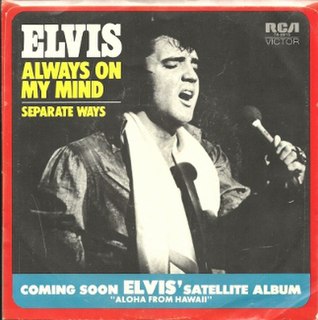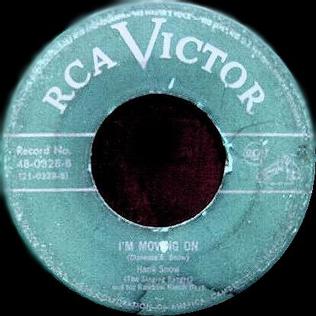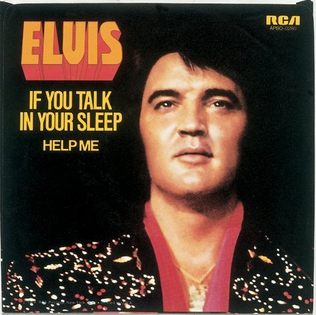Related Research Articles

William Smith Monroe was an American mandolinist, singer, and songwriter, who created the bluegrass music genre. Because of this, he is often called the "Father of Bluegrass".
Rockabilly is one of the earliest styles of rock and roll music. It dates back to the early 1950s in the United States, especially the South. As a genre it blends the sound of Western musical styles such as country with that of rhythm and blues, leading to what is considered "classic" rock and roll. Some have also described it as a blend of bluegrass with rock and roll. The term "rockabilly" itself is a portmanteau of "rock" and "hillbilly", the latter a reference to the country music that contributed strongly to the style. Other important influences on rockabilly include western swing, boogie-woogie, jump blues, and electric blues.

"That's All Right Mama" is a song written and originally performed by blues singer Arthur Crudup and recorded in 1946. It "stands as a convincing front-runner for rock ‘n’ roll’s ground zero", according to one source. It is best known as the debut single recorded and released by Elvis Presley. Presley's version was recorded on July 5, 1954, and released on July 19, 1954 with "Blue Moon of Kentucky" as the B-side. It was ranked number 113 on the 2010 Rolling Stone magazine list of the "500 Greatest Songs of All Time".

"Always on My Mind" is a ballad song written by Wayne Carson, Johnny Christopher and Mark James. The song has been a crossover hit, charting in both the country and western and pop categories, and AllMusic lists over 300 recorded releases of the song in versions by dozens of performers, including notably Brenda Lee in 1972, Elvis Presley in that same year, John Wesley Ryles in 1979, Willie Nelson's Grammy Award-winning version in 1982 and Pet Shop Boys in 1987.
"Blue Moon of Kentucky" is a waltz written in 1945 by bluegrass musician Bill Monroe and recorded by his band, the Blue Grass Boys. The song has since been recorded by many artists, including Elvis Presley. "Blue Moon of Kentucky" is the official bluegrass song of Kentucky.

"(Let Me Be Your) Teddy Bear" is a popular song first recorded by Elvis Presley in 1957 for the soundtrack of his second motion picture, Loving You, during which Presley performs the song on screen. It was written by Kal Mann and Bernie Lowe and published in 1957 by Gladys Music.

"Are You Lonesome Tonight?" is a song written by Roy Turk and Lou Handman in 1926. It was recorded several times in 1927—first by Charles Hart, with successful versions by Vaughn De Leath, Henry Burr, and the duet of Jerry Macy and John Ryan. In 1950 the Blue Barron Orchestra version reached the top twenty on the Billboard's Pop Singles chart.

Reggie Grimes Young Jr. was an American musician who was lead guitarist in the American Sound Studio house band, The Memphis Boys, and was a leading session musician. He played on various recordings with artists such as Elvis Presley, Joe Cocker, Dobie Gray, Joe Tex, Merrilee Rush, B.J. Thomas, John Prine, Dusty Springfield, Herbie Mann, J.J. Cale, Dionne Warwick, Roy Hamilton, Willie Nelson, Waylon Jennings, the Box Tops, Johnny Cash, Jerry Lee Lewis, Merle Haggard, Joey Tempest, George Strait, and The Highwaymen. Young was inducted into the Musicians Hall of Fame and Museum in 2019.
"Have I Told You Lately That I Love You?" is a popular song written by Scotty Wiseman for the 1944 musical film, Sing, Neighbor, Sing and performed by Lulu Belle and Scotty. It was the greatest hit of Wiseman and his wife and one of the first country music songs to attract major attention in the pop music field. Its repeating fourth line is "Well darling, I'm telling you now." Although it was featured in the movie, it wasn't released by them until 1947. The first released version of this song was by Gene Autry in 1945.

"I Forgot to Remember to Forget" is a 1955 rockabilly and country song, first recorded by Elvis Presley written by Stan Kesler and Charlie Feathers. It was Elvis' first charting hit and first no. 1 record nationally. The single was the fifth and final single released on Sun Records before Elvis moved to RCA Records.

"I'm Moving On" is a 1950 country standard written by Hank Snow.

"Oh Lonesome Me" is a popular song written and recorded in December 1957 by Don Gibson with Chet Atkins producing it for RCA Victor in Nashville. Released in 1958, the song topped the country chart for eight non-consecutive weeks. On what became the Billboard Hot 100, it peaked at No. 7. It was Gibson's only Top 10 hit on the pop chart. Its B-side was "I Can't Stop Loving You", which peaked at No. 7 on the C&W Jockey charts and became a standard song about unrequited love. The vocal backings on both songs were provided by the Jordanaires.

"Wear My Ring Around Your Neck" is a song written by Bert Carroll and Russell Moody, performed by Elvis Presley, which was released in 1958. It was particularly notable for breaking a string of ten consecutive number 1 hits for Presley achieved in just two years. It was Presley's 6th number-one hit in the American R&B Charts, and peaked at number 2 on the American Pop Charts.

"Paralyzed" is a 1956 song recorded by Elvis Presley for his album Elvis. The song was recorded on September 1, 1956, and has been well received by modern music critics. The song was written by Otis Blackwell, with Elvis receiving partial song-writing credit.

"Take Good Care of Her" is a 1961 song written by Arthur Kent and Ed Warren and recorded by Adam Wade. It reached number twenty on the R&B charts and number seven on the Hot 100. In the song, the narrator speaks to the groom of his ex-girlfriend.

"Walk a Mile in My Shoes" is a song written by Joe South, who had a hit with it in 1970. South was also producer and arranger of the track, and of its B-side, "Shelter". The single was credited to "Joe South and the Believers"; the Believers included his brother Tommy South and his sister-in-law Barbara South.
"I Love You Because" is a song written and recorded by country music singer and songwriter Leon Payne in 1949. The song has been covered by several artists throughout the years, including hit cover versions by Al Martino in 1963 and Jim Reeves in 1964.

"If You Talk in Your Sleep" is a 1974 Elvis Presley song released as a single and featured on Elvis Presley's 1975 album Promised Land. The song was written by Red West and Johnny Christopher, who had earlier written "Mama Liked the Roses" and "Always on My Mind", both recorded by Elvis Presley.
"They'll Never Take Her Love from Me" is a country song popularized by Hank Williams in 1950. In 1961, Johnny Horton also had a hit with the song, and many others have covered it.
References
- 1 2 "Song: Sleepy-Eyed John". Second Hand Songs. Retrieved October 28, 2018.
- ↑ Gerald F. Vaughn (1982). "Tex Atchison: Fancy Fiddling and Fancy Singing". JEMF Quarterly. John Edwards Memorial Foundation. 18: 151–54.
- ↑ "Tex Atchison | Biography & History". AllMusic.
- ↑ "78 Record: Ole Rasmussen And His Nebraska Cornhuskers - Sleepy Eyed John (1950)" – via www.45worlds.com.
- ↑ Staff (July 1, 1950). "Record Reviews". Billboard . p. 104. ISSN 0006-2510.
- ↑ Charles K. Wolfe (2015). Kentucky Country: Folk and Country Music of Kentucky. University Press of Kentucky. p. 59. ISBN 9780813149608.
- ↑ Neil V. Rosenberg; Charles K. Wolfe (2007). The Music of Bill Monroe. University of Illinois Press. p. 93. ISBN 9780252031212.
- ↑ "Special Elvis Collectibles at the Last Auction at Graceland – Elvis Presley".
- ↑ Joel Whitburn (2008). Joel Whitburn Presents Across the Charts: The 1960s. Hal Leonard. p. 183. ISBN 9780898201758.
- ↑ "Johnny Duncan And The Blue Grass Boys - Sleepy-Eyed John" – via www.45cat.com.
- ↑ "1. juni 1975" – via tv.nrk.no.
- ↑ Family, Bear. "Ole Rasmussen CD: Sleepy Eyed John". Bear Family Records.